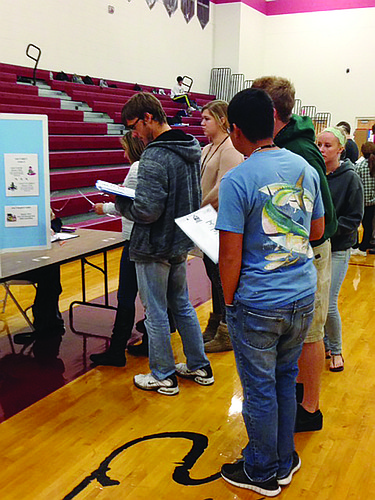- May 1, 2025
-
-
Loading

Not sure exactly when, or how, this happened, but I’ve become that guy who shakes his head and mutters to his wife about teenagers. Their bloated sense of entitlement. Their lack of purpose. Their strange and irritating music.
Why? I washed cars in summers and shoveled snow off driveways in winters for cash when I was 11. I had my first real job, at McDonald’s, when I was 14. Starting salary: $3.50 an hour. When I was 16, I worked two jobs over the summer. I even got promoted from ice cream to waiting tables at Friendly’s. No, I didn’t walk uphill both ways to school.
But four hours I spent at Braden River High School the morning of Nov. 19 made me rethink my attitude toward teenagers. It was through The Big Bank Theory, a program sponsored by the Manatee Chamber Foundation. The program is designed to give high school seniors a real-life look at what it’s like to set a budget, pay bills and live the realities of life. All six public high schools in Manatee County participated.
Each student is randomly assigned a profile of a 25-year-old, down to his or her education, job, salary and family situation for one month. So a single architect with a master’s degree and no kids has more money to spend, on both necessities and extras, than a welder with two young children and a stay-at-home spouse.
The students then visit 13 life “storefronts,” run by volunteers from the business and general community. These booths are for everything that happens in life: transportation, utilities, insurance, clothing and groceries. There’s a “that’s life” station, where students are dealt a variety of setbacks, and some bonuses. There’s also a station to go back to school and, finally, a “just for fun” booth that’s filled with entertainment options.
All the booths have a variety of choices. You can take a bus or a buy a Hummer. Brand name or generic groceries. A family vacation or go out to a lunch. The kind of budget choices everyone makes in life.
I ran the “just for fun” station. I had concerts, sporting events, family vacations and more at my disposal to tempt the students.
This is when my generalization of teenagers shifted. One of the first students I met, in the role of an auto mechanic, turned down the instant gratification of a concert for $50 and instead bought lunch for $10.
A few minutes later two students approached the booth. They hadn’t yet bought food, rented an apartment or figured out transportation. One was ready to buy some fun when the other says, “Like, wait, shouldn’t we pay our bills first?”
I heard many more of those types of budget-conscious, mature comments.
Multiple students asked if buying something at the fun station was mandatory, reasoning they might forgo fun for spending more on more important things. Another student turned down everything I offered her, except for renting two video games for $5: “I’m an artist, man,” the student says. “I’m broke.”
All told I walked away impressed with many of the students. They might listen to music that makes my ears recoil, but when it comes to managing a budget, these kids are alright.
Mark Gordon is the deputy managing editor of the Business Observer.